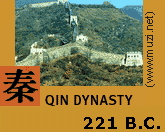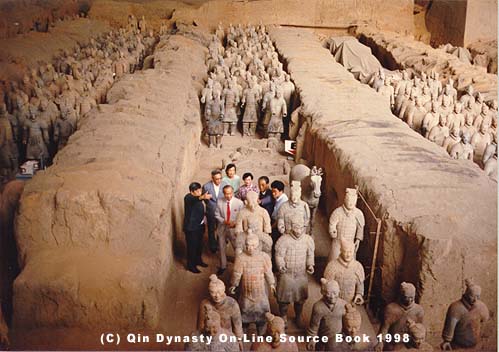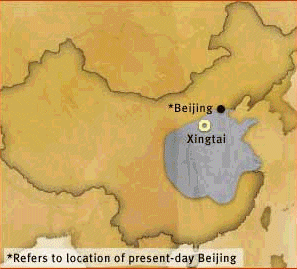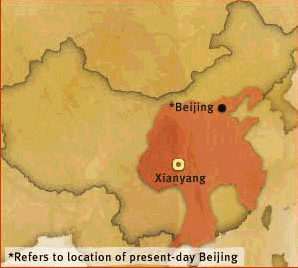
The Qin Dynasty


Only high officials from abroad are given this eye level tour of the First Emperor's tomb. In effect, the warriors are still protecting the Legalist spirit of China. President Clinton was given the same tour in September of 1999. (from the Qin Dynasty on-line source book).


The Qin Dynasty brought an end to the Warring States period and began to expand
into frontiers.
the following is excerpted from Li Ung Bing's Outline of Early Chinese History
General statement: We have seen that the Chinese established themselves first in tribal groups here and there along the course of the Yellow River at a remote period. In course of time the tribal government developed into a feudal system with hundreds of petty states scattered throughout the land which they called the Middle Kingdom. The next movement was towards consolidation which reduced the number of states to seven. The union of the Seven States into one homogeneous whole was inevitable, and finally came in 221 BC as the result of the statesmanship of Prince Zheng of Qin. While his dynasty lasted only fifteen years, still he left many permanent traces of his rule.
6.b. His early life: Very little is known of his early life, save that he inherited his father's princely throne at a very tender age. Tradition says that Prince Zheng was not the son of Zhuang Xiang Wang, his reputed father. The latter, as the story goes, had been held as a hostage in the state of Zhao. While there he met a wealthy merchant named Lu Puwei, who, pretending to show his devotion to the young prince, made him take to wife a beautiful woman, already pregnant.
It seems that this story was of later invention, and the work of personal prejudice. At any rate the son to whom Zhuang Xiang Wang's wife gave birth was one of the greatest empire builders of antiquity. During his minority, Lu Puwei was his first prime minister and in that capacity exercised much of the royal power.
6.c. Conquest of the six states: The Zhou Dynasty with its eight-hundred years of power was already a thing of the past when Prince Zheng became king of the state of Qin. The last representative of the family of Zhou had already been made away with by one of his predecessors. The work that was left for him to accomplish, therefore, was not the overthrow of the ruling house but the conquest of the six sister states.
The policy pursued by Prince Zheng, or rather by his statesmen and generals, is best summed up in a statement of Xu Dai, a contemporary politician. "This morning," said he, "when crossing the river, I saw a mussel open its shell to sun itself. Immediately an oyster catcher thrust its bill in to eat the mussel; but the latter closed its shell and held the bird fast. 'If it doesn't rain today or tomorrow,' cried the oyster catcher, 'there will be a dead mussel.' 'And if you don't get out of this by today or tomorrow, there will be a dead oyster catcher,' retorted the mussel. Meanwhile up came a fisherman and carried off both of them. I fear that the state of Qin will some day be our fisherman."
In other words, Qin played off one state against another till they were all exhausted and then conquered them one by one. Han, the smallest of the states, was annexed first and the rest were added in the following order: Wei, Chu, Zhao, Yan, and Qi, the last being the easternmost state.
6.d. Shi Huangdi, or the First Emperor: Prince Zheng made a new title for himself. This title, Huangdi, signifies in his own words, that "the holder is equal to the Three Divine Rulers in virtue and the Five Emperors in achievements." It was retained by his successors down to the last of the Manchus, and has been rendered "emperor" in English. He also discontinued the practice of giving a deceased ruler a posthumous name. He decreed that thenceforth he was to be known as Shi Huangdi, or First Emperor, his immediate successor, Er Shi, or Second Emperor, and so on even down to the ten-thousandth generation.
As regards the name of his dynasty, he let it be known under the old name of his state. "It is interesting to note," says the author of "A Sketch of Chinese History," "that the name China is probably derived from this name, Qin (pronounced Ch'in), for the first westerners who knew anything about the Chinese, spoke of them as the people of the land of Ch'in, which afterwards became the word 'China.'"
6.e. End of feudalism: Having built an empire on the ruins of the old feudal system, the question arose as to how this huge territory should be governed. The majority of the statesmen, the slaves of tradition, would have partitioned it out among a number of feudal lords as had been the custom with the Zhous. Such an idea, of course, was offensive to a man who wanted history to begin anew with himself. Divided it must be, but there must be no feudal lords.
Accordingly, Shi Huangdi divided it into thirty-six provinces, each of which was subdivided into districts, governed by agents directly responsible to him. One agent looked after civil matters, another after military affairs, and a third acted as a sort of inspector or intelligence officer of the Throne. Such was the form of government he introduced, and such has been the form of government that has come down to modern times, although in two thousand years, it has undergone many changes in name and detail. All ownership of land and its inhabitants was vested in Shi Huangdi.
6.f. The burning of classics: No radical change call take place in China without encountering the opposition of the literati. This was no less the case then than it is now. To abolish feudalism by one stroke was a radical change indeed. Whether the change was for the better or the worse, the people of letters took no time to inquire; whatever was good enough for their fathers was good enough for them and their children. They found numerous authorities in the classics to support their contention, and these they freely quoted to show that Shi Huangdi was wrong. They continued to criticize the government to such an extent that something had to be done to silence the voice of antiquity.
As a consequence, an order came from the Throne, directing every subject in the empire, under pain of branding and banishment, to send all the literature he possessed, except works on agriculture, medicine, and divination, to the nearest official to be destroyed by fire.
As to how far this decree was enforced, it is hard to say. At any rate, it exempted all libraries of the government, or such as were in possession of a class of officials called Learned Men. If any real damage was done to Chinese literature under the decree in question, it is safe to say that it was not of such a nature as later writers would have us believe. Still, this extreme measure failed to secure the desired end, and a number of the people of letters in Xianyang, the capital, was subsequently buried alive.
6.g. The Great Wall: The union of China was not effected a moment too soon. In the north, a formidable foe had risen, whom the Chinese called Xiongnu. One Chinese authority seems to think that these tribespeople descended directly from Xiong Yu, son of Jie, the last ruler of the House of Xia. He is said to have taken to wife his father's concubines and to have migrated into the steppes north of the Mongolian Desert. If we may accept this suggestion, the Xiongnu began to terrify the Chinese as early as the middle of the Zhou Dynasty, for in the Book of Odes, we read of many expeditions against a tribe known as Xiong Yu.
The Xiongnu were a nomadic people, moving from place to place with their flocks and herds and always in search of fresh pastures. They had no written language. As soon as their children were able to ride on the back of the sheep, they were taught the use of bows and arrows and how to hunt down small animals. Thus they became skillful archers when they were grown up. They lived chiefly by hunting and used the skins of animals for clothing. Those who were in the prime of life received the best of everything while the old could eat only what was left by them.
It was because of this barbarous people that the Great Wall was built by Shi Huangdi. This wall extends about 1,500 miles long. It must not be supposed that this gigantic work was done all at once. As a matter of fact, separate walls had been erected by the states which bordered upon the territory of the Xiongnu. What was actually done by Shi Huangdi was the uniting, strengthening, and improving of the existing structures; and this work was executed under the supervision of General Meng Tian [Allen-Dupont].
It is stated that the immediate cause of the completion of this wall was an oracle which Shi Huangdi consulted. It told him that it was Hu, or Xiongnu, was destined to overthrow the Qin empire. Shi Huangdi died in 210 BC while making a tour through the northern country.
6.h. Some characteristics of the age: The art of sculpture had reached a high stage of development. At the same time, the taste of the emperor undoubtedly gave a great impetus to the art. The style of writing known as Lesser Seal, which was designed to take the place of the older and more cumbrous Big Seal, was an invention of his reign. Meng Tian [Allen-Dupont], the general of the Great Wall fame, is generally believed to have been the inventor of the brush used in writing. The paper, so far as the cheaper bamboo is concerned, was not a product of this age (it came into use in the Han Dynasty); but according to the best information, the expensive paper made of silk was in existence when the brush was invented. The invention of convenient writing materials and the simplification of the characters, marked the beginning of literary advancement in China.
Another characteristic of the age was the ascendency that had been attained by the teachings of Xunzi. Almost all the statesmen who adorned the court of Shi Huangdi were people of that school. They believed that the nature of human was bad and that peace and order were the result of fear. Human should be awed into submission, or there would be lawlessness. For the many unjust and cruel laws and acts of tyranny with which the name of Shi Huangdi is closely associated, he in reality was not so much to blame as was the spirit of the age.
The same motive that led to the building of the splendid palaces, and to the erecting of huge and costly stone monuments, was responsible for the meting out of the severest sentences on the least show of offense. It was to impress the people at large with the greatness of the emperor and to make them stand in awe of him. If those measures succeeded in arousing the fear of the people, they also served to alienate their love, for the death of Shi Huangdi was followed almost immediately by the breakup of the unity once the pride of his reign.
Another characteristic of the age was the regard in which a merchant or trader was held. He was no better than a criminal. The first batches of men sent to work on the Great Wall and to serve on the southern frontier consisted of criminals and merchants. At a later date this punishment fell upon those whose fathers were known to have been merchants.
6.i. End of Qin Dynasty: Shi Huangdi desired to leave his throne to his first son Fu Su. Unfortunately, this son, who had been banished beyond the Great Wall because he had had the audacity to remonstrate with the all-powerful emperor on the policy of his government, was not present at the time of his father's death.
Worse still, the decree of succession fell into the hands of Li Si [Buck-Wiseman], the prime minister, and Zhao Gao [Howland-Esposito], a eunuch, who were devoted friends of the emperor's second son, Hu Hai. The death of Shi Huangdi was kept a secret until the imperial party reached Xianyang. A false decree was then promulgated in the name of the deceased Emperor. In accordance with this Fu Su (together with Meng Tian) was put to death, and Hu Hai ascended the throne under the name of Er Shi, or Second Emperor.
Er Shi proved a worse tyrant than his father, whose vices he inherited but without his greatness. During his short reign, Zhao Gao became the real power after Li Si's execution (208 BC). A story which is familiar to every Chinese schoolchild well shows the position this eunuch occupied in the government. One day, so the story runs, Er Shi showed his courtiers a picture of a deer. "It's a horse," cried Zhao Gao, and none of the crowd had the courage to contradict him, for the eunuch was more powerful than the sovereign.
Rebellion was rife throughout the empire. In less than two years the descendants of the earlier Six States had planted small kingdoms alongside those of other rebel leaders. Er Shi in 206 BC was murdered by Zhao Gao, and Shi Huangdi's grandson was placed on the throne. He gave himself up to Liu Bang---the first general who entered the Land Within the Pass, and afterwards the founder of the Han Dynasty---and brought with him the jade seal of state. He had been on the throne for less than 200 days; but in this brief time, however, he had succeeded in punishing Zhao Gao [Howland-Esposito] for the murder of his uncle.
(from Li Ung Bing's Outline of Early Chinese History)